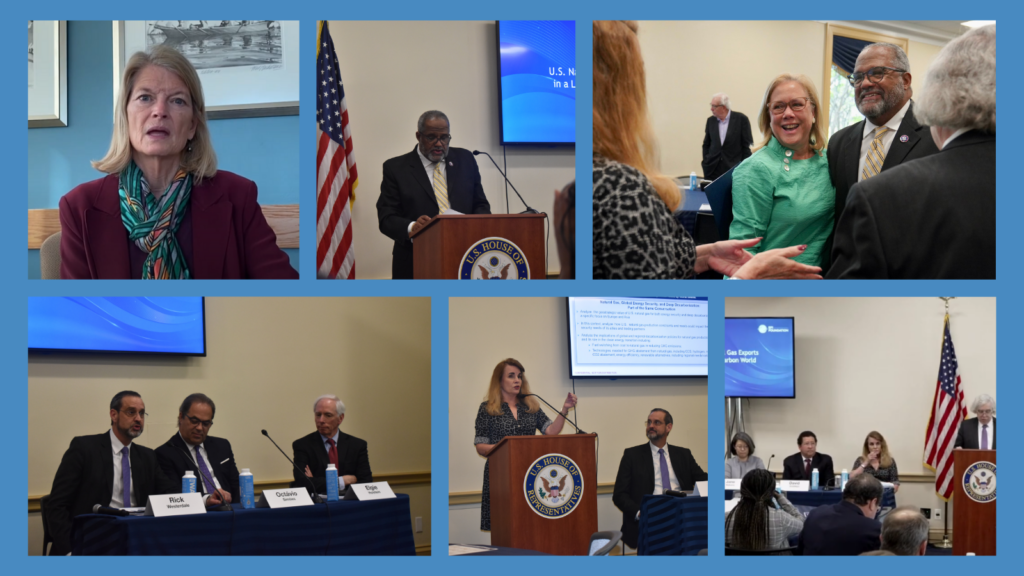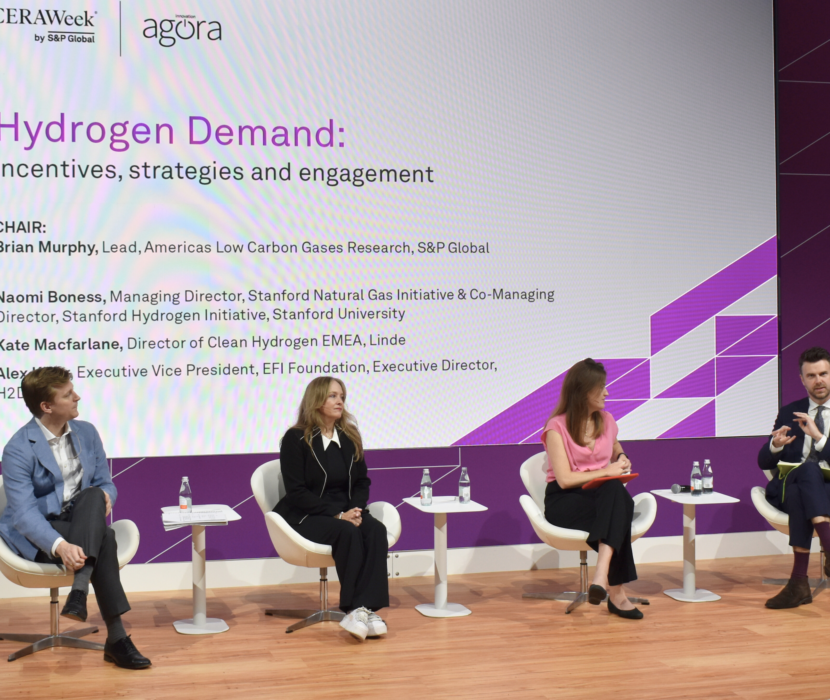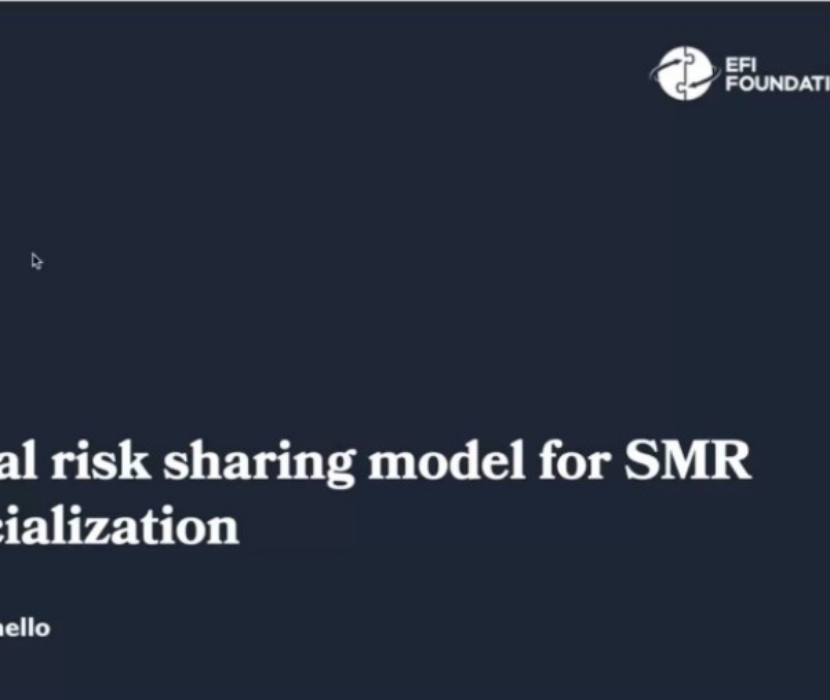
On April 25, 2023, the EFI Foundation released a new report detailing conclusions from a January 2023 stakeholder workshop on the role that U.S. natural gas exports play in goals for global economic development, climate, energy security, and food security.
The report, “The Role of U.S. Natural Gas Exports in a Low-Carbon World,” summarizes nine key points that were emphasized by the January workshop attendees, who were 78 senior executives and experts in the natural gas industry, U.S. government, consulting firms, law firms, financial institutions, non-government organizations, think tanks, and foreign governments. This work is the second phase of the EFI Foundation’s global gas study—continuing from our work in 2021 to convene stakeholder workshops in eight regions around the world on the role of natural gas in transitioning to low- and zero-carbon energy systems, and our 2022 workshop and report focusing on natural gas and the U.S.-Asia relationship.
Takeaways of this new report include that climate goals and energy security need to be addressed in the same conversation, and that permitting issues are a major challenge to meeting deep decarbonization and energy security goals. Other takeaways relate to natural gas challenges in the United States, the interconnectivity of global natural gas markets, the United States’s role as the preeminent global supplier, and Europe’s and Asia’s natural gas needs.
On April 25, we released this report on Capitol Hill to an audience of congressional staff, policymakers, and non-profit and industry professionals in the natural gas sector. There was bipartisan representation with remarks from Senator Lisa Murkowski (R-Alaska) and Representative Troy Carter (D-Louisiana). We also featured remarks from EFI Foundation staff (CEO Ernest Moniz and Principal Melanie Kenderdine), industry (including Octavio Simões, CEO of Tellurian), and non-profits (including Elgie Holstein, Environmental Defense Fund), reflecting in-part a range of the stakeholders present at our January workshop.
The United States is the world’s largest exporter of natural gas. According to the U.S. Energy Information Administration (EIA), U.S. liquefied natural gas (LNG) exports averaged approximately 10.6 billion cubic feet per day in 2022. Following Russia’s invasion of Ukraine, the short- and medium-term role of U.S. LNG in global energy markets has become a central part of pragmatic conversations about how to promote both the clean energy transition and energy security.
One report takeaway is that natural gas will continue to be crucial for fulfilling global decarbonization goals. In a summary of the report conclusion, EFI Foundation’s Melanie Kenderdine said that since 2005, 61% of U.S. emissions reductions in the power sector are due to the shift from coal to natural gas according to EIA. (The other 39% of emissions reductions are the result of non-carbon generation.)
“Gas in particular has got to be front and center if we are to have any success in negotiating that transition,” said EFI Foundation President and CEO Ernest Moniz in opening remarks.
Keynote Remarks: Natural Gas Abroad & At Home
In video remarks prepared for the event, Senator Lisa Murkowski (Republican, Alaska) stated that LNG exports benefit the United States and its partners and allies. She said these exports help reduce the world’s reliance on exports from Russia or from any other nations that “wield energy as a weapon to coerce and extort.”
Sen. Murkowski’s remarks related to the report takeaway that the United States must decide what role to play in supplying natural gas and enabling global decarbonization goals.
“The world is counting on us, and our response should be to produce what is needed for as long as it is needed,” Sen. Murkowski said.
Another report takeaway was that natural gas prices in the United States are affected by the dynamics of global energy markets and also by domestic politics and concerns. In domestic conversations about natural gas and energy, public participation and community engagement should be at the forefront.
This point was a focus from Representative Troy Carter (Democrat, Louisiana’s 2nd congressional district). In his keynote remarks, Rep. Carter emphasized his state’s abundance of natural gas and the need for open dialogue with frontline communities.
“Importantly, environmental justice must be at the center of any action to address disproportionate health and environmental impacts from natural gas distributors on communities, especially communities of color,” Rep. Carter said.
U.S. Natural Gas in Europe and Asia
David Goldwyn, energy advisory group chairman of the Atlantic Council, elaborated on the outlook for Europe’s natural gas needs. He cited two aspects of the European strategy: (1) a short- and medium-term focus on accessing gas, with a goal of moving away from dependence on Russian gas and diversifying their gas supply, and (2) “doubling down” on its adherence to the energy transition to reduce its dependence on natural gas.
A report takeaway was that although Europe needs gas in the near term, it may not be a long-term market for U.S. exports. However, Goldwyn said to not expect Europe’s need for gas imports to end imminently.
“While [Europe is] focused on the short and medium term, the medium term could be a long time,” Goldwyn said. “Europe expects to be importing gas from the U.S. for a while.”
Goldwyn also emphasized that another challenge for Europe is permitting and financing infrastructure to support its LNG supply.
Jane Nakano is a senior fellow in the Energy Security and Climate Change Program at the Center for Strategic and International Studies. Nakano explained the implications of natural gas in Asia. She cited the EFI Foundation report, stating that for parts of Asia that are industrialized, such as Korea and Japan, the main concern is about availability of LNG supply. For developing countries, the main concern is natural gas affordability.
“I’d be remiss if I don’t stress how I think in Asia, there’s virtually no aversion to gas,” Nakano said. “Whether it’s coal or gas, I think they really want to first serve the needs of the… population, but there is a growing awareness [of climate change]. They want natural gas to be part of their solution, but security of supply [is] a big concern.”
Her remarks echoed the report takeaway that in Asia, developing countries are primarily concerned about the affordability of natural gas, while developed nations worry more about the reliability of supply.
Affordability & Environmental Impact
Edward Morse, a managing director at Citigroup, participated with video remarks and echoed similar sentiments. He said that one obstacle is to make the energy transition affordable to not only the people in countries with advanced economies, but also for people in emerging market countries.
He said the challenges that natural gas poses in a clean energy transition need to be approached thoughtfully.
“The challenge is really to make people happy, and not revolt against the transition which, as I said, is a revolutionary process,” he said.
Another takeaway is that technology deployment and additional regulations will be necessary for the natural gas industry to address its greenhouse gas emissions, including leaks. Natural gas (methane) is greenhouse gas that is 25 times more potent than carbon dioxide.
Octavio Simões, who is CEO of Houston-based natural gas company Tellurian, said his company has “zero tolerance for methane leaks” and is equipped with the tools to address that issue quickly. He said he sees methane leakage as a “red herring” that distracts from larger issues at hand for the natural gas industry.
However, Elgie Holstein, who is Senior Director for Strategic Planning at the Environmental Defense Fund, said the issue of methane emissions has not been resolved, specifically among companies that he said aren’t choosing “to go about this business correctly and responsibly.” He elaborated on the advancement of leak detection technologies that can help solve this problem and stated that there are more than 100 companies in North America that are marketing these technologies for portions of the oil and gas industry.
EFI President and CEO Ernest Moniz said the process of reaching clean energy goals, including the role of natural gas, is more important than focusing solely on the end goal.
“‘Pragmatism at speed is better than perfection that comes too late,’” Moniz said, quoting EFI Advisory Board Chairman, Lord John Browne, from a recent Financial Times opinion piece. Moniz continued, “I think that pragmatism is beginning to sink in, as we’ve seen in some recent discussions.”
– Kaycee Hubbard, Communications Intern
with contributions from Alicia Moulton (Deputy Director of Communications) and Rick Westerdale (Executive Director)
(Share this post with others.)




